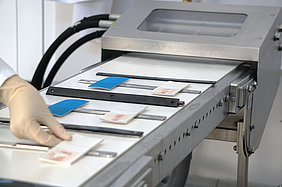A new method for cleaning conveyor belts in food production can replace the widely used disinfection chemicals: plasma-treated water is effective against microbial contamination at a shorter exposure time and degrades without envrionmentally hazardous traces. These results were recently published in the journal Innovative Food Science and Emerging Technologies.
Microbial contamination can occur along the entire food processing chain. In order to minimize health risks for consumers, all production processes must be carried out safely. It is therefore common practice to clean conveyor belts with disinfectants, for example in vegetable or meat processing. However, the processes should not only ensure food safety, but also be environmentally friendly and sustainable.
A team of researchers from science and industry has therefore developed a new method that uses plasma-treated water to clean food conveyor belts instead of the amine-based disinfectants commonly used in the industry.
To produce plasma treated water, plasma treated air is injected into distilled or tap water. Plasma-treated water thus contains many reactive nitrogen and oxygen species such as nitrous acid (HNO2), nitrogen monoxide (NO*) and ozone (O3), which occur naturally and which degrade without leaving traces that are harmful to the environment, but overall have a high antimicrobial efficiency
The scientists examined the use of plasma-treated water in comparison to common washing processes using the example of residues from minced meat and Braeburn apples on silicone and PVC conveyor belts. The cleaning process usually included pre-cleaning with water (20 bar, room temperature) and mild, fat-dissolving foam, spraying with the active substance and subsequent cleaning of the belts with tap water. As a result, the use of plasma-treated water reduced the number of germs just as efficiently as an amine-based disinfectant (by >3 log10 CFU/cm²), and with a significantly shorter inactivation time of just one minute compared to 15 minutes with conventional cleaning.
In order to monitor the cleaning success, an RGB color sensor system was also developed for the automated detection of food residues on the belts. "Actually, it's about the microbial colonization on the conveyor belts, which can become a health hazard. In practice, however, monitoring the microorganisms would be too time-consuming and expensive, especially since they only develop on the organic residues," explains Dr Julia Durek, scientist at the Leibniz Institute for Agricultural Engineering and Bioeconomy in Potsdam. "We therefore tested the sensor system for detecting food residues. The optical system works very quickly and precisely detects even the smallest of residues. It is easy to use and can therefore be implemented for automated hygiene monitoring in food production.”
Dr Julia Durek is reflecting further optimization options: “The slightly higher number of germs found on silicone belts, which have a slightly rougher surface than PVC belts, show that in the future we should pay more attention to damaged or aged conveyor belts. In the indentations of rough spots, microorganisms may survive an application of plasma-processed water. In addition, especially with animal products, the use of warm or hot water could provide a better fat-dissolving effect and thus also an additional decontamination benefit.”
Research was carried out in the frame of the joint project "Networking of bioefficient physical detection and processing modules for sustainable cleaning and disinfection in the food production chain (PROMONA)". The already completed project has received financial support from the Federal Ministry of Food and Agriculture (BMEL) as part of the promotion of innovations for safe, resource-saving and sustainable food production. Partners were the Leibniz Institute for Plasma Research and Technology e.V., Greifswald and the companies Silicann Systems GmbH, Rostock, and Walter Gerätebau GmbH, Sachsenheim. 'Promona' was coordinated by the Leibniz Institute for Agricultural Engineering and Bioeconomy (ATB).
Original publication:
Durek, J.; Fröhling, A.; Stüpmann, F.; Neumann, S.; Ehlbeck, J.; Schlüter, O. (2023): Optimized cleaning of conveyor belts using plasma-processed water assisted by optical detection of food residues. Innovative Food Science and Emerging Technologies. https://doi.org/10.1016/j.ifset.2023.103379
Contact:
Dr Julia Durek - Scientist in the ‚Promona‘ project
jdurek@atb-potsdam.de
Dr Oliver Schlüter - Head of the ‚Promona‘ project
oschlueter@atb-potsdam.de
Dr Ulrike Glaubitz - Puclic Relations
Tel.: +49 (0)331 5699-820, presse@atb-potsdam.de
June 7th is International Food Safety Day since 2019. The aim is to raise awareness of the importance of food safety to protect the health of consumers.
In its 'Healthy Foods' program area, the Leibniz Institute for Agricultural Engineering and Bioeconomy e.V. (ATB) has been intensively researching technical solutions for more food safety for years. The focus is in particular on non-thermal treatment methods for sanitation, such as the use of hydrostatic high pressure, cold atmospheric pressure plasma, high-voltage pulses and ultrasound.
The Leibniz Institute for Agricultural Engineering and Bioeconomy is a pioneer and a driver of bioeconomy research. We create the scientific foundation to transform agricultural, food, industrial and energy systems into a comprehensive bio-based circular economy.
We develop and integrate techniques, processes and management strategies, effectively converging technologies to intelligently crosslink highly diverse bioeconomic production systems and to control them in a knowledge-based, adaptive and largely automated manner. We conduct research in dialogue with society - knowledge-motivated and application-inspired.

